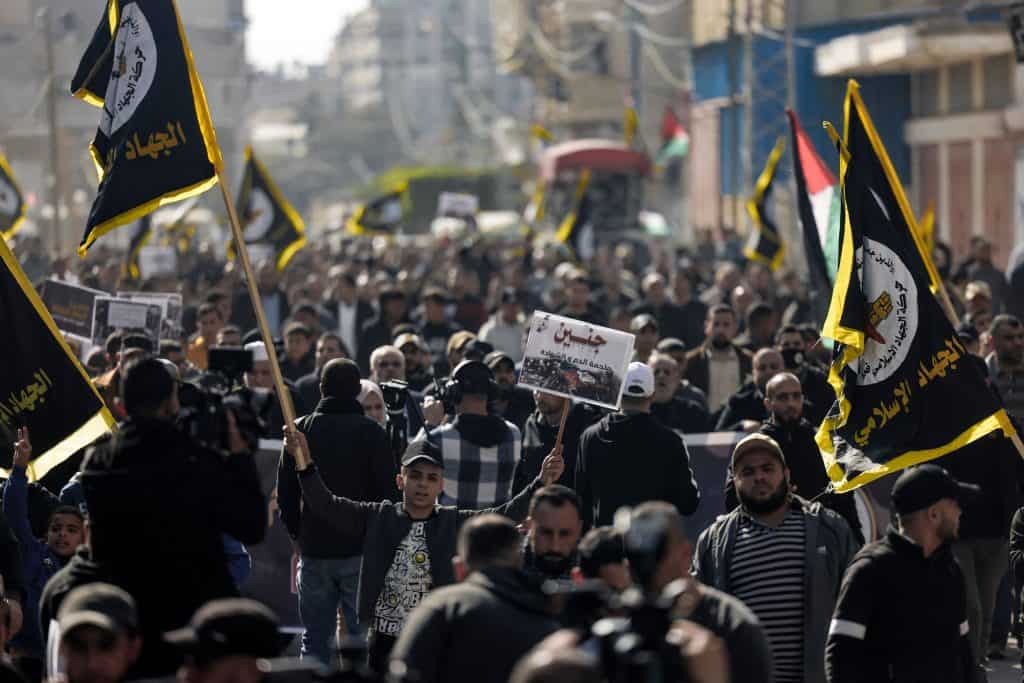
The West Bank is undergoing a period of major instability due to the significant allocation of resources by various armed groups, namely Islamic Jihad, al-Aqsa Martyrs Brigades, and Hamas. Adding fuel to the fire, Iran and Hezbollah are supporting the unrest by transferring arms and finances.
A marked surge in hostilities between Israeli security forces and Palestinian militants began in June 2021 when Islamic Jihad Jenin commander Jamil al-Amouri and two Palestinian security forces officers died in a shootout with a special unit of the Israeli Border Police. The occurrence signified the start of a persistent conflict that has swept across parts of the West Bank, including some areas of Israel.
At some point in 2022, Iran recognized an opportunity in the West Bank and consequently intensified its support to Islamic Jihad and other affiliated militant groups. Iran has boosted its assistance to extremist groups like Islamic Jihad in a bid to heighten destabilization efforts in the West Bank and ramp up attacks on Israeli targets. Iran has also recognized the vulnerability of the Palestinian Authority. It sees the destabilization of the West Bank as a way to weaken its authority further, thus benefiting Hamas, a major beneficiary of the regime’s support.
Speaking to FDD’s Long War Journal, an Israeli security official expressed concerns over Iranian funding to Islamic Jihad and the group’s potential to execute acts of terrorism in the West Bank. “Iran is the Islamic Jihad’s funder. The Islamic Jihad is working very hard to promote terror in the West Bank. The money enables purchase of weapons and munitions, and the establishment of improvised weapons manufacturing facilities in the West Bank and Gaza.”
Furthermore, as per the words of the Israeli security official, Iran is actively instigating and promoting terrorism within the West Bank. “Of course, it’s the Iranian regime who wishes to see Israel being destroyed from within. Therefore, they encourage incitement and terrorism in the West Bank.”
The concerns expressed by the Israeli security official are not unfounded. In August 2022, the head of the IRGC, General Hossein Salami, implied that Iran is contributing to the armament of the West Bank. Later, in April 2023, Salami vaguely suggested Iran may be involved in the West Bank.
“The Zionist regime has surrounded itself with walls of several hundred meters, and uses the most powerful sensors to create [its own] security, so that not even an animal can cross its borders. But invisible hands have armed the West Bank, and you [now] see modern automatic rifles and automatic weapons in the hands of the Palestinians,” said Salami.
Although shooting attacks and deploying IEDs against Israeli security personnel in the West Bank have become commonplace, recent developments have highlighted a notable surge in violence. Evidence of this escalation emerged on June 19, when an Israeli military vehicle was severely damaged by an IED in Jenin, allegedly planted by Islamic Jihad. In response, an IDF Apache helicopter gunship was dispatched and fired a missile at an open area while injured Israeli security forces were extracted from the vehicle.
On June 21, three militants were killed in the northern West Bank during a rare Israeli drone strike. The IDF attributed the successful operation to intelligence provided by the Shabak, the country’s internal security agency. The drone strike targeted a militant cell that had engaged in several shooting attacks against West Bank communities, the most recent near Jalamah village.
It is possible that the Israeli defense establishment may view the drone strike as a necessary operation. Still, it is also likely that they are utilizing this action as a means to send a message of deterrence to Islamic Jihad, Hamas, and other armed groups, particularly in light of the significant IED attack that took place in Jenin only two days before.
Even though Israeli security forces – and to some degree – the Palestinian Authority, are trying to reduce the ongoing violence in the West Bank and Israel, it appears the chaos instigated by Palestinian militant groups and Iran is persistent and will not dissipate easily. Despite the combined efforts of the Palestinians, Israelis, and allied nations, a viable solution to address the ongoing violence plaguing the West Bank remains elusive.







